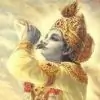Me in violet
I don't have my Gita on me, so can't cite any verses. But no, there is nothing against becoming a sanyasi, but usually, when people did it, they normally left others to handle their worldly responsibilities.
Yes. I agree. And fair enough. But worldly responsibilities never end. They keep on coming. So time never comes for Sanyas even for true sanyasi by mind who can't find any other person as his alternative to fulfill those duties. Can that be the conclusion of this? And can one's responsibility be transferred or shifted to somebody else first of all? Dharm vyapar nahi hota. Wo ati kathor aur vyaktigat hota hai.
Worldly responsibilities may never end, but personal responsibilities do. Like when a person steps down as the CEO, or CFO, or CMO, or COO of a company, his place is usually filled by someone else. If somebody decides that he's unable to continue a certain responsibility, the responsible thing to do is to hand it over to someone else and then move on. Out here, we are talking about one's worldly responsibilities towards others, not spiritual responsibilities towards oneself - the activities aimed @ attaining ultimate salvation
On your other example above, Dhruva and Buddha's tapasya couldn't be more different from each other. Dhruva did not have a plan to renounce the world - he wanted to win back his right to his father, which is why he went into meditation. Vishnu granted him that he'd get that, and also succeed his father as king, whereas in Buddha's case, even after he got enlightened, not only did he not return, but his wife and son joined the Sangha. Essentially, anybody who could fulfill the karmaic duties of succeeding his father were, AFAIK gone. In fact, Dhruva is a perfect example of why Buddha was not the ideal path to follow.
If his wife and son also joined the sangha, what was the worldly responsibility left out to be fulfilled then? I don't know Buddha's story in detail actually.
Well, he was the crown prince of Kapilavastu, and his father Sudhodhana was the king, and wanted a successor. Now, Siddhartha was unwilling to do it after he attained his wisdom. Fair enough, but in that case, he should have told his father to make his son Rahul the next crown prince, and told Rahul to follow his grandfather and continue his dynasty.
This one is easy to follow - when Rama decided to do his mahaprayan, he didn't take Kush, Luv or any of his nephews w/ him. When Krishna retired, he didn't take Vajra w/ him, and when the Pandavas decided to retire, they crowned Parikshit the new ruler, they didn't take Parikshit w/ them. Essentially, they transfered their royal responsibilities to their successors so that their dynasties would continue.
IMHO, Siddhartha should have done that as well.
And one more thing. Leaving family to do tapasya in the jungle is actually Vanprasth and not Sanyas. Sanyas even comes after that. After the end of tapasya. Then sanyasi can even come back to the social world but he will keep contacts with relatives and others equally and will be detached by mind. That's the essence of sanyas. Sanyas doesn't mean leaving your family or relatives. Sanyas only means leaving your family or relatives as family or relatives. Now all in the world are equal for you. Your duties become universal and you don't need to have a station to stay or be attached permanently. But to acquire that mental state, vanprasth aashram is the earlier phase. This phase makes you prepared under any situation - because in the jungle, you will also have to demonstrate your tolerance against hot & cold and also will have to overcome fear of wild animals i.e. fear of death and also will have to achieve victory over hunger & thirst. These achievements are only possible in solitude and forced adversities. Hardships. And you can't drag your family with you in this tough austerity. Some people would become sanyasis. Some people will come back and will not be able to be free from attachments completely. They will continue this journey in the next birth since they will get those sanskaars or parts or anshas of vairaag element in them from the childhood itself. Four aashrams are elaborated in detail in Uddhav Geeta.
I understand what you are saying above, and Rahul did approach his father asking for his share of his inheritance. But here, since Siddhartha himself had abandoned his royal duties - against his father's wishes - he ought to have sent Rahul to do that part of his job. I agree that Sanyasis can have flexibility on what level of relationship they maintain w/ their families, but that wasn't my point above. My criticism - and yeah, it is a criticism - of Buddha above was that not only was he abandoning his duty to rule his kingdom, but he was not re-assigning that duty to his son, which was the next thing he should have done if he himself didn't want to be a king.
Shankara and Vivekanand were more latter examples, and with all due respect, can't be held up as reinforcements of what Vedic religious practices, as done during the first 3 yugas, were. Indeed, it would be very tough to take any of their teachings, and project it back to rationalize activities of Rama, Krishna, Arjun or anyone else, even though they take the actions of these divine figures and built up various philosophies surrounding their activities. But one can't for certain claim the reverse cause-effect. A lot of what was done by Shankara, Ramakrishna & Vivekananda was reformation of Hinduism, and that too, a subset of followers. Which is absolutely valid, but once you start reforming anything, there are departures from the original traditions that may or may not be supported by the shastras,. This of course doesn't mean that it's not Hindu or not valid in Hinduism, but it does make it likelier that the original shastras did not factor in these latter philosophers in mind, not only for obvious reasons of preceding them by millennia, but also, due to variances in the very messages themselves, be they about rituals, sacrifices, or whatever.
Very very well said. But what I say is that even Geeta is not too enthusiastic about rituals or vedic traditions as I have often mentioned about Adhyay 2 verses around 40. So instead of REFORMATION of Hinduism, I would like to call it ANOTHER INTERPRETATION of essence of Hinduism. These people interpreted the essence in their own way by digging deep into their conscience. And Geeta is open to many many alternative different paths for salvation whichever is natural to an individual specifically.
Yeah, but Geeta is not the sole book that is there to guide - there are a lot of other sources, such as the Vedas, the Puranas and if somebody picks only one of these books - in this case the Geeta - and overrides what's preached in others, than it's more than just an interpretation. Since it involves overturning traditions mentioned in other scriptures, reformation is a more accurate description of it.
Actually aside from Varaali's speculations above, I think we bypassed a more basic definition - what did we use as our benchmark to define whether a person or religion was/is Hindu? For something in those times, I'd look @ its compatibility w/ the ancient Hindu scriptures, and whether they followed those or not - particularly the Vedas, the Puranas and the Upanishads. Granted, some texts, such as Manu's Smritis, could be revised over time, since they were written by humans and transmitted orally, and wouldn't be constant over time independent of society (although it did remain unchallenged for the first 3 yugas).
I also think that this religious compatibility thing is something like software. If you bought an app 15 years ago that ran on Windows 95, that app would not run today under Windows 7, but that doesn't mean that either of those OSs are not Windows. It does however mean that Windows 7 has features that not only were not there under Windows 95, but can't be supported there either. Similarly, there are practices in the ancient scriptures that would be either impossible or illegal to try doing today - to take a very innocuous example, try doing an Ashwamedha yagna anywhere in India today, and it would be laughed @. This is not b'cos the Ashwamedha Yagna is not a Hindu tradition or that today's Hindu's ain't Hindus, it's b'cos the 'versions' of Hinduism have changed over the millennia.
I don't deny that Buddha was Hindu, although it is fair to say that the religion he started is different from Hinduism to warrant being classified as different. To continue the software analogy above, just like Firefox forked from the original Netscape, similarly, Buddhism (and Jainism and Sikhism) forked from Hinduism, and Christianity forked from Judaism. Of course, there are differences and points where those parallels end - Christianity still has a place honoring the Old Testament, whereas Buddhism doesn't have any such place for the Vedas or the Puranas.
The entire above explanation was awesome. As Lola has rightly appreciated.👏Ultimately the morals of time are decided by conscience of enlightened people of that time (which can again be one dimensional in accordance with their own personal experience - if one has experienced bliss in a particular manner, one would naturally consider only that approach to be correct). Now what personally I can say is that since Hinduism is not against any view or religion (since religion is the one which gives salvation/detachment/balanced state of mind), no view or religion (whether sprung from Hinduism or not) technically can be said to be against Hinduism even if that view itself calls itself against all other views of Hinduism and therefore against Hinduism.
Actually, to the extent that different scriptures sometimes have either paradoxical, or even downright contradictory material in them, I agree in that sense that it's tough to pin down what 'Hinduism' is for or against. But your last statement that goes from this to the idea that no view can be said to be against Hinduism does not follow from that. For instance, to pick an example, while Hinduism doesn't require idolatry, it doesn't preclude it either, and if another religion or viewpoint condemns idolatory, it cannot be said to be consistent w/ Hinduism (despite the fact that one might be able to pull out an odd text somewhere or the other in support of that view).
I'd suggest leaving this thread on Buddha, and just opening a new thread solely on Parashurama, since his various activities are very strongly in variance w/ usual dharmaic activities.
Edited by .Vrish. - 13 years ago



































